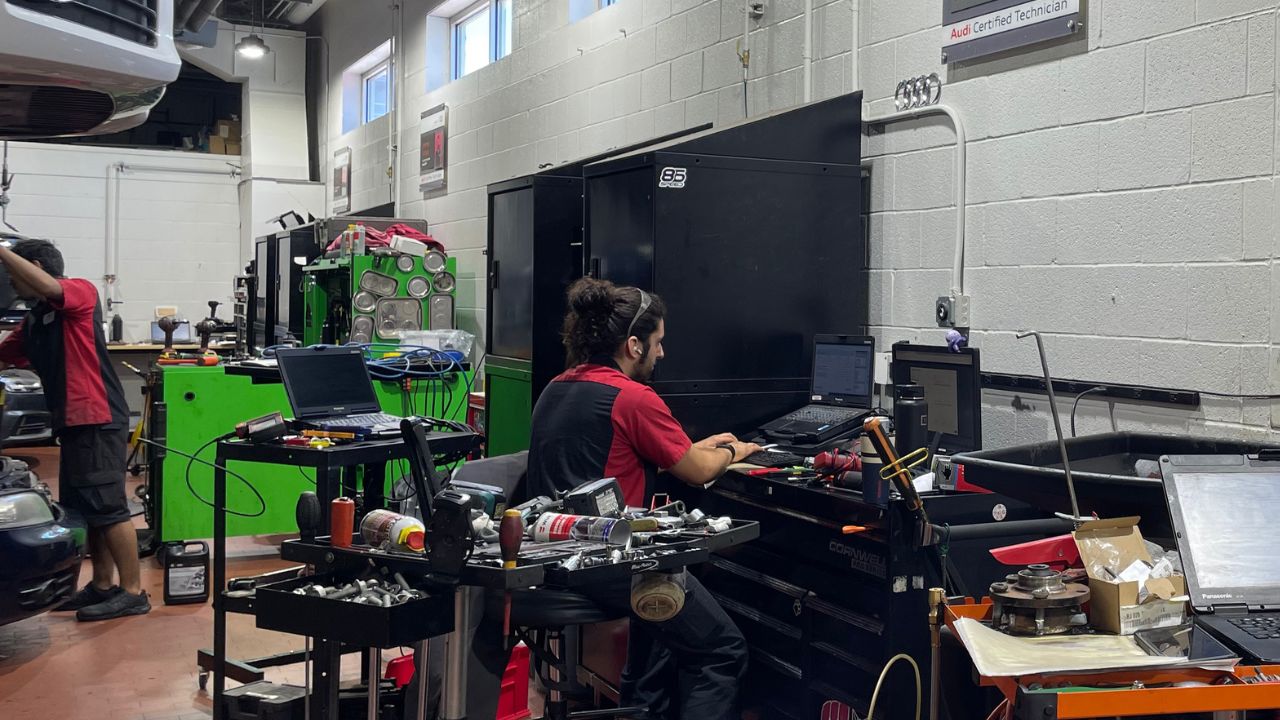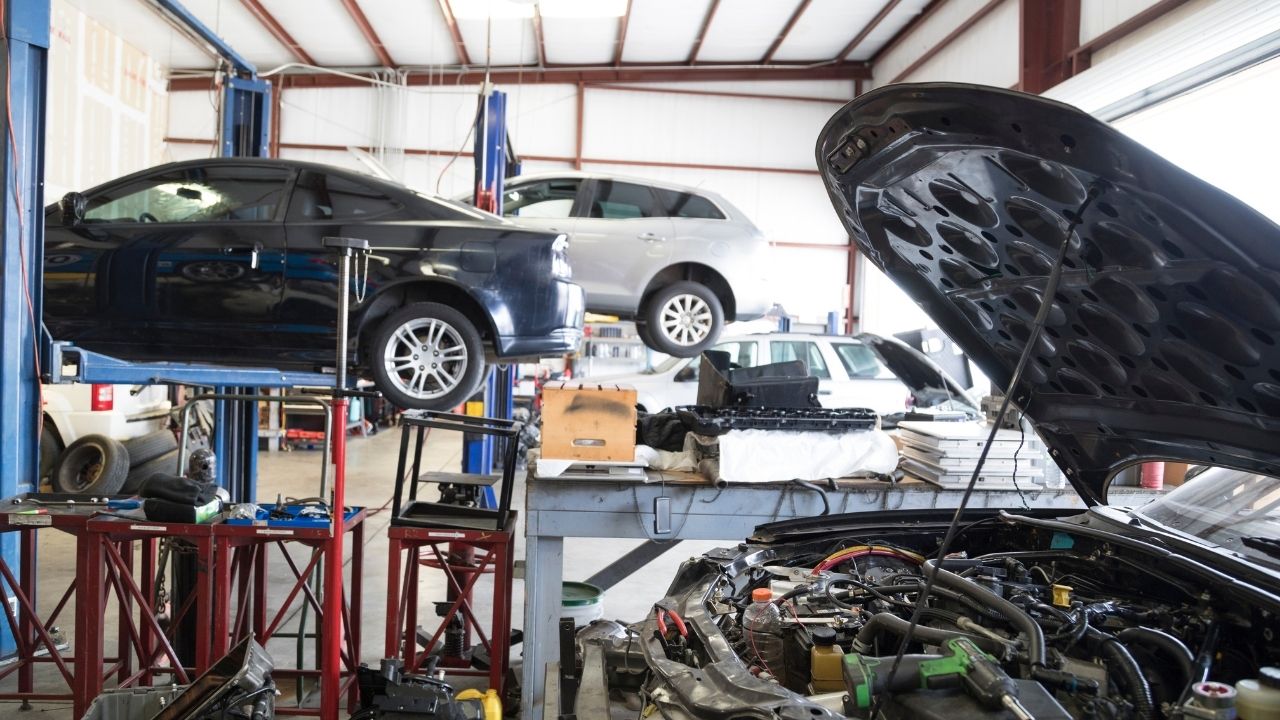A technician’s time directly impacts their earnings, especially for flat rate mechanics, making efficiency crucial. In a recent WrenchWay Shop Talk poll, 45% of technicians said they are constantly looking for ways to reduce time spent on jobs—while still maintaining quality—in order to maximize productivity.
To gather valuable time management tips, we reached out to our network of current and former auto and diesel technicians. We asked for their best advice on how they enhance their efficiency and improve workflow in the shop and summarized it for you below.
15 Ways Technicians Can Increase Efficiency
1. Mind Your Bay
It’s simple: Stay focused on your work to be more efficient. Don’t pay attention to what others are doing; concentrate on your own tasks. If someone approaches you, let them know you need to focus or shift the conversation to their work.
Charley Helvy, Diesel Instructor, suggests, “As far as distracting conversations go, asking the other person how their job is progressing is a good hint. If that doesn’t work, just be direct.”
For tasks that require your full attention and you don’t want to be disturbed, set up a signal so colleagues know not to interrupt you. Use resources that help you concentrate, like noise-canceling headphones or podcasts to stay motivated.
2. Get a Mobile or Roll Cart
Use a mobile or roll cart to keep your most-used tools within reach. Choose one that’s compact enough to move easily around. Bigger isn’t always better. Chris Craig,
Fixed Operations Content Owner, advises, “Take it a step further by reviewing what’s coming in for the day in the shop, where that’s possible, to further customize what tools are placed on your cart.” This allows you to ensure you have everything you need for the tasks ahead close by.
3. Keep Your Cell Phone in Your Box
Avoid the temptation to check your phone every spare moment. Instead, save your phone for breaks, like lunch or after work. If your family has an emergency, let them know they can call the main shop phone to reach you quickly. Keeping your phone out of sight helps you stay focused on your tasks.
4. Pick a Good Stall
Whenever possible, choose a stall that minimizes distractions. Mike Baldwin, Master Certified Service Manager, advises, “If possible, pick the stall closest to the parts department or tool crib, or furthest from the service drive or break room. This way, you stay engaged and reduce opportunities to get distracted.”
5. Stay Organized and Clean
Don’t feel pressured to organize your box or tools the way others do. Find a system that works for you—labels, foam inserts, bins, or magnet trays.
“I have a bunch of magnet trays that I will put in a line of some sort and place bolts and parts in chronological order as much as I can.”
Hunter Jackson, Master Certified Technician
Keep specialty tools in labeled bins. As Rick Kelso, Manager, says, “If I was diagnosing an inoperative headlamp, for example, I added my electrical bin to my roll cart and I had 99% of what I needed within reach.”
If you notice you’re placing tools in certain spots without thinking, there’s likely a reason—so organize accordingly. Tidy or clean your workspace at the end of each day or week so you’re ready to start fresh.
6. Use Your Peers as Valuable Resources
Stay focused on your tasks, but if you’re unsure about something, don’t hesitate to stop and ask a fellow tech or manager for help. They are there to help and can be a valuable resource of knowledge. On the flip side, you should also be ready to support others when they need assistance.
7. Ask or Use More Than One Bay
Don’t hesitate to request more than one bay when working on larger jobs that require significant teardown. There’s no “save” button that allows you to put away and come back to your work later, so having extra space can help you stay organized and make the job more manageable.
8. Create Cheat Sheets
It can be overwhelming to memorize everything, so start a notebook to keep track of different jobs, the tools used, and the necessary parts.
“I’ve started making cheat sheets of parts lists for commonly repeated large jobs, so that instead of looking up every single item required each time, I can just copy and paste.”
Bill Francis, Heavy Equipment Technician
9. Have Reminders & Keep Time
Set reminders to return items, like the wheel lock key or other supplies, to their proper places. This helps maintain organization and prevents misplacement.
Utilize a timer or clock to stay on track. This not only allows you to easily communicate how long you’ve spent on a job but also helps you identify if something is taking longer than expected. If needed, you can adjust your approach to improve efficiency.
10. Find Productivity Pitfalls
Start a daily log of all your activities, no matter how small—yes, even those quick text checks! After a few days, review your entries to uncover patterns in your “silly” tasks. You might be surprised at how much time is slipping away.
“For example, if you smoke a cigarette for 5 minutes and smoke a 1/2 pack a day while at work, that costs you 50 minutes. That was 50 minutes that you could have been more productive,” says Rick Kelso, Manager.
11. Communicate With Each Department
Make sure to talk with each department regularly—parts, service, and beyond. If you don’t receive your parts on time, you won’t be able to fix cars for customers when they expect them or as the Service Advisor has promised. Good communication is essential for a smooth workflow and a successful payday.
12. Do Repairs By the Book, Speed Comes Later
Begin by completing repairs according to established guidelines. Understanding how each task should be done sets a solid foundation. Once you’re familiar with the process, you can adjust and refine your methods to work more efficiently. Focus on quality first—speed will improve over time.
13. Use Technology or AI
Take full advantage of the tools your shop has already provided. Chances are your shop has already implemented tools to make communication, scheduling, and time management more efficient, but they’re only helpful if you utilize them.
14. Prioritize Regular Training
Stay updated with the latest techniques and technologies through regular training. Enhancing your skills can lead to faster, more efficient work, benefiting both you and your shop. Invest in learning to keep your knowledge sharp and your performance high.
15. Maintain Work-life Balance
Make sure to take regular breaks and manage your workload to avoid burnout. A well-rested mechanic is not only more productive but also more efficient. Prioritizing your physical and mental well-being will benefit both you and your work.
Embrace the Improvements
Implementing these time management tips can lead to significant improvements in both productivity and job satisfaction for technicians. By focusing on organization, effective communication, and continuous learning, you can create a more efficient work environment. Remember, maximizing your time not only enhances your performance but also contributes to your overall success in the automotive and diesel fields. Embrace these strategies and watch your efficiency grow.





